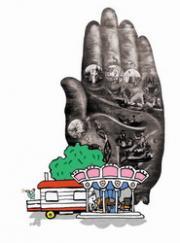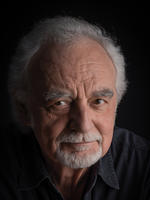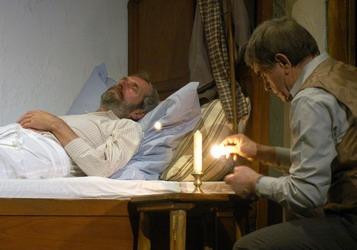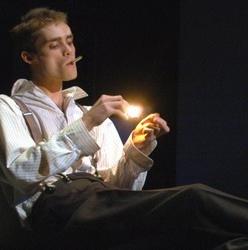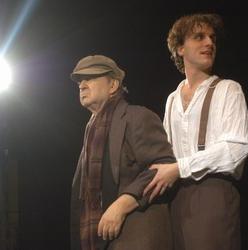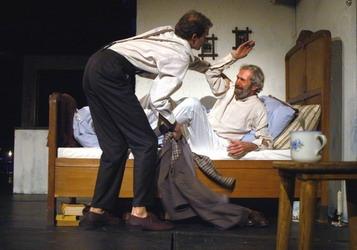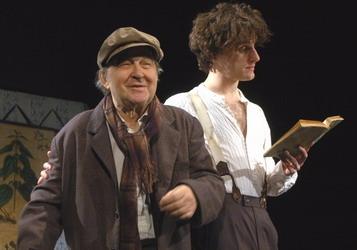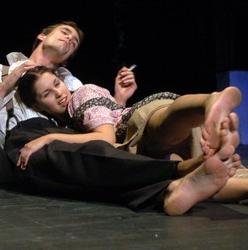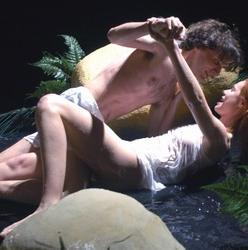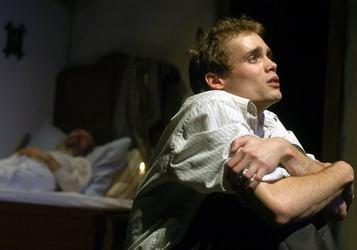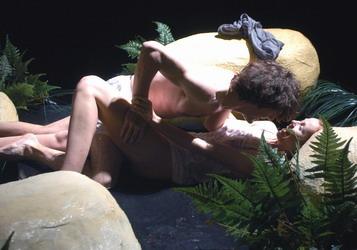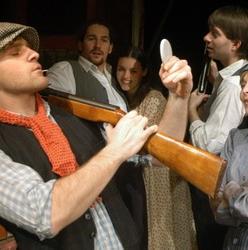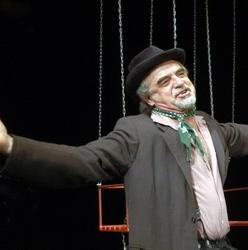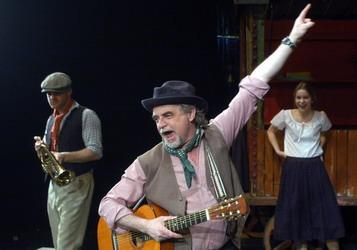The Story of Vojta and Terina in the Brno City Theatre
Petra Klobasová 15. March 2005 zdroj Naše noviny
Hrubín’s Romance for a Bugle-Horn waited to see its new adaptation in the Brno City Theatre. This time, it is reworked by director Aleš Bergman and dramatic adviser Ladislav Stýblo. The performance comes out of Hrubín’s original and the script of successful Otakar Vávra’s film.
Both the authors of the dramatic adaptation agree that the play is very attractive on one hand, but the matter is very difficult to be processed dramatically on the other hand. However, their effort turned out fine, the story of two young people, whose love cannot be completed due to their bonds to their families, takes place on the stage. The authors of adaptations managed to transfer quite intelligibly the prosaic poem on stage, without any forcible devaluation of Hrubín’s work.
The greatest danger was in the work with time, as the present permeates with the future several times in Hrubín’s original. Thus, the audience must fold up from individual fragments the action, the tragedy of a human life when a young man must choose between his family and love (poet’s experiences when he was young).
The authors used special means to make the place of action authentic – a shooting gallery came to the stage, a merry-go-round was simulated by two seats hanging from the ceiling, a piece of nature was represented with a stream with real water. The Programme with poems by František Hrubín which have not been issued so far also deserves mentioning.
Romance for a Bugle-Horn
David Kroča 25. February 2005 zdroj Czech Radio 3 - Vltava
The Romance for a Bugle-Horn performed by the Brno City Theatre is a nostalgic glance back at principal themes of life – love and death. The visiting director Aleš Bergman sandwiched the chamber story of unfulfilled love of a twenty-year-old student and a sixteen-year-old carney girl into a sixty-minute performance without any interval. That is why the parable of nostalgia for vain desires of the youth can be watched in one urgent stream.
As the author of adaptation, Bergman made small adjustments of the model. While the central figure of young student is nameless in the original poem, he is called Vašek in the film, but he was given the name Vojta in the dramatic adaptation. The director alternates sensibly two time levels which create a formal construction of the famous poem. The current level of action intercepting the process of reflection is represented by old Vojta played by Miloš Kročil.
The metaphoric dimension of the performance is also evident in successful scenes with two carousel seats going down the stage symbolically not only for Vojta and Terina in the moment of their becoming closer to each other, but also for both the narrators who recite in concord their lyric declarations sitting on the seats in one of newly added scenes.
The presentation is dominated by appropriate and natural acting of the majority of actors. On Sunday premiere I could see Oldřich Smysl playing the part of young Vojta. His boyish hero obeys humbly his father’s advices concerning e.g. shaving with a razor, but is maturing quickly as for his feelings to his elected girl or his respect to his dead ancestor. Old Vojta played by Miloš Kročil is equipped with dignity and, due to his precise diction, with unprecedented pathos rising in refrains. Eva Ventrubová impressed an original appearance to her Terina. It is a roguish figure abounding with energy which condenses pure child’s love and likeable catching desire for uplift and freedom.
The Brno Romance for a Bugle-Horn ends with a dreamy scene where wild Terina appears for the last time in the light, sitting on a carousel seat. Her sad song about the lover she is missing forever sounds from recording. This final scene impressed the audience very much, although the used theatrical means are simple and undemanding. Maybe the simplicity and unsophistication are keys to the poetic text which well-known passages invite spectators to repeat them together with the actors on the stage.
Romance Sings Mainly Sad
Luboš Mareček 21. February 2005 zdroj MF Dnes
The Brno City Theatre performed a famous František Hrubín’s poem at the weekend
Mainly a touching tone will sound to the audiences of the new play performed by the Brno City Theatre. The famous poem Romance for a Bugle-Horn had its premiere at the weekend. The great Hrubín’s lyrical solo is masterfully condensed nostalgia of youth and the first unfulfilled love and death.
The director Aleš Bergman used a film script of the famous film by Otakar Vávra from the year 1966. The Romance for a Bugle-Horn was played on domestic stages recently – in Prague and Ostrava for the last time. Performers of this Czech poetic jewellery must tame its elusive character first. The story itself shines through the poem in parts and as if by chance. The Romance for a Bugle-Horn hides inside poet’s intimate experience and other themes. What is more important in life than the first shaving, the first outbreak of love and the death of some relative? Fortunately, Bergman got everything substantial in his ninety-minute performance: the sad story, the lyrical atmosphere and the urgency of poet’s inside sadness. The direction uses various means: a complete shooting-gallery arrives on the stage, two carousel seats hang down the ceiling and young lovers sitting on them are left at the mercy of two light cones.
The actors avoided attractive sentimentality, although they speak touchingly about touching things. The boyish but sure performance of Jiří Hájek matches with the charming teenage amorousness of Eva Ventrubová. To see Jiří Tomek as a senile grandfather is a real experience. The melodramatic urgency of the performance will attract and fine-tune those viewers who walk around the poetry in life.
Hrubín’s Romance Warms with Youth, Love and Hope
Libuše Zbořilová 21. February 2005 zdroj Rovnost
The newly rehearsed title continues directly the Brno line of poetic productions created recently by Legend, Radúz and Mahulena, Koločava or Mácha’s May.
Aleš Bergman, JAMU (Janacek Academy of Music and Dramatic Arts) pedagogue and experienced director, created a sufficiently bearing scenario just on the poetic texts, with understanding of all the complexity of composition where reality mingles with memories from various time levels, the task of narrator is generationally divided into two parts (including added recordings), the story unfolds fluently in interiors and almost naturalistic milieu of typical village places. Bergman managed to unite different time levels and the changing environment with memories to the first love, cruelty of death, and the hope given by the story of a village fair as the poet himself might have lived through into an emotionally expressive utterance speaking to the present day.
A significant part of the performance is played by Jaroslav Milfajt’s scene design. Milfajt, having a good knowledge of village environment and a good sense of stage stylization, created interiors of old Vojta’s flat and grandfather’s house in the portals, the middle of the stage was used for a common with fair attractions, a merry-go-round, a shooting-gallery, a birch grove with a bench for lovers, but also a weir, a cemetery and a pub. Immovable guard stones on the central axis have several meanings. Playing points alternate fluently and without problems thanks to the revolving stage and the lighting system, the audience soon grasps the principle of telling the story; the poetic character does not fade away but it grows flavoured with humorous sequences, naturally, so that the eighty minutes of the stage poem runs away like water.
For the central couple of young Vojta and Terina the director Bergman chose fresh graduates from JAMU - Jiří Hájek (Oldřich Smysl in the second premiere) and Eva Ventrubová. Perhaps too innocent Hájek can present the hesitation of the youth with his moderate body movement and facial gestures, inserting conflicts with reality and looking for his inner strength into his disjoined diction. As if he fought with his height (a well-built actor appeared definitively!), he bends down to his partners unnecessarily and lets himself be driven off. The part of comedian girl Terina is a success for Eva Ventrubová. She gets her wild character going in the magic naivety of the age of sixteen, she is clinging, hesitating, lovely, she can defend herself touchingly. Looking healthy, with parted dark hair twisted in long plaits, she is real Julia of the Czech village when she makes rings of her hair or flies on a carousel seat towards the auditorium at the conclusion ...
Jiří Tomek added another successful part to the gallery of his characters performed on the stage of the Brno City Theatre – Vojta’s grandfather who had a stroke (alternating with Karel Bartoň). He nowhere exceeds the stylization rate of an old, forgetful, poor man living somewhere in the past, he is touching in the exact scope of his illness and awakening before death. His silent leaving of the world shows clearly why Vojta cannot leave him alone to escape with Terina. Miloš Kročil highly utilized his long-time experience in the interpretation of poetic texts in the character of old Vojta. His civil and disciplined expression brings in the performance the feeling of the right to memories, though bitter, and evokes their substantiation; his distance of adult age increases the credibility of the story. Ladislav Kolář as his father manifests a similar rate of informality and interest in his performance.
The dramatic adaptation of Hrubín’s Romance for a Bugle-Horn will have a wider scope: for older generations it will be the reason to refresh memories, for young audiences it will be the meeting with a beautiful poetry of not extinct ages.
The most beautiful epic poem...
Jiří P. Kříž 1. December -1 zdroj Právo
The most beautiful epic poem of the Czech poetry of the twentieth century - Romance for a Bugle-Horn by František Hrubín – saddened and brightened the stage of the Brno City Theatre with feelings which are rare in the current time, with the atmosphere of Lešany fair of the 1930’s and the first great love in the region of the Sázava weir, this time directed by Aleš Bergman.
The dramatizations were begun by one of film masterpieces of Otakar Vávra, doyen of the Czech direction, in the year 1967. Radovan Lipus’s Romance in the Ostrava National Moravian-Silesian Theatre had the best scene. The most successful was the Bugle-Horn by Ivan Krobot in the Prague National Theatre. Bergman much approached Lipus’s interpretation, he even exceeded it in a lot of things. Bergman, definitively a nova on the dramatic sky full of burnt-out stars, used Hrubín’s text.
He preserved the melodiousness of the poem with its intermezzos, repetitions, refrains, codas and final da capo al fine. And Hrubín’s language as well. And his nostalgia, but never sentimentality: over the lost age of youth with its impulsiveness, tenderness and the first meeting of inevitable death. Bergman raised the sovereign atmosphere of the Romance up to the Heaven’s Gate with a lyric song about Terina Carry me, carry me resonating exceptionally with Hrubín. It was written and composed by Pavla Milcová who sings the song in Moravian harmonies.
By the way, Terina acted by Eva Ventrubová is surely the most exact carney girl on the Czech stages, as for the type and the range of the poetic girl symbol: longing for the first love, simple, true, infatuatingly vital, betrayed. And exactly accurate Vojta (Oldřich Smysl or Jiří Hájek), Viktor (Ján Jackuliak), old Vojta (Miloš Kročil) and others around her.
When you go to see Bergman’s Romance, buy a programme. There is a lot of original information, unpublished so far. About Hrubín, Romance for a Bugle-Horn and connections... And some say that commercial performances are played in the Brno City Theatre. If the Romance is successful, it will be one of those excellent commercial performances we should thank God for.
Romance Did Not Loose Its Poetry
1. December -1 zdroj Bulletin of the town of Blansko
It is often rather precarious to translate a well-known classical poetic text to a drama as the poetic word addressing a reader need not be so delightful to a theater-goer. However, František Hrubín’s “Romance for a Bugle-Horn” was adapted for theatre and filmed. And the author himself wrote a story version for the film.
The director Aleš Bergman, belonging to a younger creative generation, came out of the original text as well as the film and story versions at his production of the “Romance for a Bugle-Horn” for the Brno City Theatre. It should be said at the beginning that the Brno performance preserves the romanticism and the poetics of the original. As it was revealed by the first premiere (19th February), the audience accepted graciously the adaptation of Hrubín’s work. The dramatist and director Aleš Bergman invited music collaborators Pavla Milcová and Peter Binder, scenographer Jaroslav Milfajt (guest), and costume designer Andrea Kučerová to cooperate. Ladislav Stýblo is a dramatic advisor.
Bergman, as he himself said, accepted the offer to cooperate with the Brno City Theatre as he had chosen two protagonists, Jiří Hájek, to act the part of young Vojta, and Eva Ventrubová, to play the role of Terina, whom he got to know in the time he taught them at the Janáček Academy of Music and Dramatic Arts (JAMU). (Vojta is alternated by Odřich Smysl). The first premiere performance was balanced and managed well by all actors. Miloš Kročil, Pavla Ptáčková, Ján Jackuliak, Ladislav Kolář, Eva Gorčicová, Karel Mišurec, Pavel Kunert and others introduced themselves in individual roles. They were all good, but the performance of Jiří Tomek playing the part of Grandfather was impressive and unforgettable.
Romance for a Bugle-Horn
Jiří Kříž 1. December -1 zdroj Xantypa
Hrubín’s Romance was dramatized for the first time by Otakar Vávra, doyen of the Czech film direction, in 1967. Of scenic versions, Radovan Lipus’s Romance in the National Moravian-Silesian Theatre in Ostrava occupies the highest place. Bergman approached a lot Lipus’s concept and exceeded it in many aspects. He preserved the music character of the poem with its intermezzos, repetitions, refrains, codas and final da capo al fine. And Hrubín’s characteristic language. And nostalgia: author’s sorrow for lost youth with its playfulness, tenderness, as well as the first meeting with inevitable death. The paramount atmosphere of the romance was raised up to the heavenly gates in the lyrical song Carry me, carry me - about Terina. The song was written, composed and sung in Moravian harmonies by Pavla Milcová. Terina acted by Eva Ventrubová is surely the most precise carney girl as for her type and the range of the dramatic symbol of a girl: anxious with first love, uncomplicated, real, live, betrayed. And similarly precise Vojta (Oldřich Smysl or Jiří Hájek), Viktor (Ján Jackuliak), old Vojta (Miloš Kročil) and others around her.

